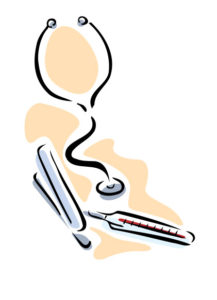Producing 15 a day; County need is 40; seeking additional components; working collaboratively with ASU
 Yavapai Community College’s Career and Technical Education (CTEC) Program is using its equipment to produce plastic face shields for County health workers. According to the College, the need for face shields is 40 a day in Yavapai County. However, the equipment at CTEC can produce only 15.
Yavapai Community College’s Career and Technical Education (CTEC) Program is using its equipment to produce plastic face shields for County health workers. According to the College, the need for face shields is 40 a day in Yavapai County. However, the equipment at CTEC can produce only 15.
Moreover, it is finding it challenging to find the kind of plastic material to use in its 3d printers to meet the demand.
Following below is the April 13 press release from the College describing the project.
COLLEGE PRESS RELEASE
As the coronavirus spreads, healthcare workers have become our front-line defenders – waging war against COVID-19 in emergency rooms, triage centers and screening locations across the United States.
At Yavapai College, instructors at the Career and Technical Education Center (CTEC) are using equipment and ingenuity to give those health care workers more to fight with.
“We have all this capability,” YC’s Matt Mintzmyer said. “Why not try to help?”
Professor of Aerospace Science and Naval Reservist Matt Mintzmyer heads Yavapai College’s Unmanned Aircraft Systems program, which uses 3D printers to create components for drones. Last week, Mintzmyer began refitting the 3D printer to produce personal protective equipment (PPEs) for healthcare workers, specifically the clear face-shields that are currently in short supply.
“We’re still kind of at the beginning of everything,” he said. “[Last] Monday, ASU reached out to us to see if we wanted to work collaboratively.” YC got the face shield design from Arizona State, which is working with several partners to provide the PPEs to southern Arizona. “But Northern Arizona and Yavapai County were not being serviced,” he said. So Mintzmyer coordinated with local Emergency Management officials to create PPEs for Yavapai County.
“Yavapai County Emergency Management is requesting around 40 face masks a day.” Mintzmyer said. He made setting modifications so YC’s 3D printers can accommodate the design and produce one mask frame every three hours. “We can print 15 a day on the Makerbots that we have. So we’ll do what we can.”
YC is still seeking additional components for the masks. “We still need the clear plastic for the sheath,” Mintzmyer said. The best material would be .050 mil plexiglass, but the plastic from school notebook dividers would work in the mask frames, as well. “Any sort of sheet plastic that’s clear. We’re looking for donations from office supply stories.” They are also seeking elastic for the headbands.
